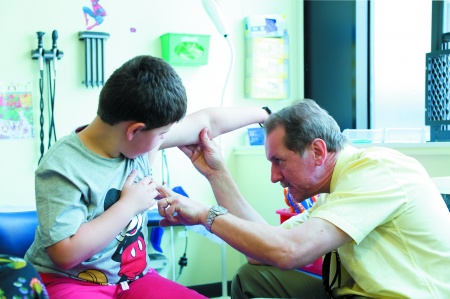
June 28, 2013, by Charlotte Anscombe
Me, some research & a blog – The Clinical Series: Tackling rumours around childhood eczema
Hello readers and welcome back to the Clinical Series. This series was born when my work in the communications team generated an enthusiasm to learn more about the work of the academics who have crossed my path. This blog created the opportunity for me to do a little further investigation, to delve deeper into the science and to share my findings with you. This is the fourth blog of the series – if you’ve missed any, have a catch up. Enjoy.
Although it is great when scientists discover new treatments, researchers from the Centre of Evidenced Based Dermatology, here at the University of Nottingham show how worthwhile it can be to study the treatments patients currently use.
Their work on childhood eczema particularly caught my attention. Childhood eczema affects up to 20% of children worldwide and its prevalence is increasing. Eczema is an inflammation of the skin producing severe itching and causing it to become reddened, dry and scaly.
Unfortunately, there are many uncertainties surrounding the care of children with eczema. However, scientists from the Centre of Evidence Based Dermatology at the University of Nottingham are recognised internationally for systematically reviewing the existing evidence on eczema treatments, prioritising future research, and answering these identified uncertainties. The centre’s aim, which I like because it is short and to the point, is to ‘do really good research’ and this is exactly what they have done.
They have carried out numerous trials which have provided answers to healthcare professionals and families of eczema sufferers. It really did shock me when they were able to calculate how much money has actually been saved due to their work.
One example of this is their research showing that installing a water softener does not bring additional relief for eczema sufferers. It had been hoped that water softeners would provide simple but effective relief for the many children who suffer from this itchy and uncomfortable condition. This trial result, although disappointing for patients, does at least provide clear guidance on the topic and will save patients from wasting money by installing water softeners into their homes, typically costing them £500-£1000.
When looking at this research online, typing it into Google brought up many websites where this research was covered in the press – I was surprised with the amount of coverage it received. This is proof that although the research technically found nothing – this is significant to a lot of people.
Having reviewed the evidence for all eczema treatments, the team were also able to demonstrate that commonly used interventions such as bath oils and anti-bacterial interventions lack evidence for their effectiveness. These interventions are costly to the NHS; £3.75- £5 million is spent on bath additives alone each year.
Their research also highlighted that evening primrose oil is not an effective treatment for eczema. This resulted in its license being revoked by the Medicines Healthcare Regulatory Authority – the first example of a license being withdrawn through lack of efficacy rather than to safety concerns. This again has saved a lot of money; it was costing the NHS £7 million per year for ineffective prescriptions.
The above trials have all tested the effectiveness of treatments; however another trial shows how certain life choices can influence the risk of developing eczema. It was found that eating fast food three times a week may lead to eczema in children, while eating three or more portions of fruit a week cuts the risks. This research came out of a large collaborative project which involved nearly two million children in more than 100 countries, making it the biggest of its kind, even winning a Guinness World Record. People often believed that fast foods were associated with things like acne but not allergies so it wasn’t surprising that this finding also kicked up a media storm.
When suffering with a horribly unpleasant condition, it is good to be confident in the treatments you are using. The Centre of Evidenced based Dermatology aims to do this, just as their name suggests. They bring us evidence of what should or in these cases, should not be used to make sure patients are getting the best treatments they can.

good research